![]()
| Yunnan, China | Yuanyang | 2002.04.27 - 05.03 |
Hill Tribes and Rice Terraces
Most travelers pass through Yunnan Province without realizing that Yuanyang exists. We were also going to unknowingly bypass Yuanyang, intending to travel from the border town of Hekou to Kunming, Yunnan's capital. Luckily, we met Lim, a Chinese decent Malaysian, on a boat in Halong Bay, Vietnam. Lim knows China well. Having recently traveled through Yunnan, he recommended Yuanyang as his favorite town. We changed our route to include a stop in Yuanyang.
Yuanyang is within the Autonomous Region of Hani and Yi Tribes. No special permit is required to enter. Yunnan is called the gem of ethnic minority people. One in three of the entire Yunnan Province population is minority, and of the 56 ethnic minorities in China, 25 live in Yunnan. However, with the influx of Han Chinese, the unique culture of the tribes is being affected.
Yuanyang has several positive aspects: almost no tourists, photographically beautiful rice terraces stretching across steep hillsides, and daily ethnic minority markets in nearby towns. The markets are packed with minorities of Hani, Yi, Miao, and Yao tribes. Each has their individual customs and dress. The Chinese calendar, such as the day of the bird, determines market dates. The location of the market on a particular day must be ascertained from a local. A Hong Kong native, Tam, who owns the BackPacker Rendezvous Guesthouse in Yuanyang, is an excellent source. Even if his guesthouse is full, ask Tam to show the location of upcoming markets on his hand-drawn wall map. Also be sure to view his photo CD of area ethnic minorities. His guesthouse is small with 3 rooms. At mealtimes, Tam accompanies his guests to his favorite restaurant in town. Ask to see the small picture book on Yunnan that sells at this restaurant for ¥25 (US$3.03).
Since Yuanyang has no nightlife, Tam wants to limit his guests to those who are motivated to explore on their own and have a genuine interest in viewing minorities. For this reason, Tam prefers not to advertise. Those who enjoy a quiet remote environment can contact Tam at:
BackPacker Rendezvous
Tel: +86-(0)873-562-4625
Tam is fluent in English. When he has no guests, he sometimes closes the guesthouse to travel on his own. Telephone in advance to be sure he's home.
Within our two years of travel, Yuanyang was the least touristy. In fact, on our first outing, Wes was the only (partial) Caucasian in a 100km radius.
GETTING THERE
From the Yunnan-Vietnamese border town of Hekou, a direct bus departs for Yuanyang
daily at 06:00. The travel time, including the time to replace 2 flat tires en
route, is 8 hours.
From Kunming, there are 3 direct buses daily. One leaves in the morning and two overnight sleeper buses depart late in the afternoon.
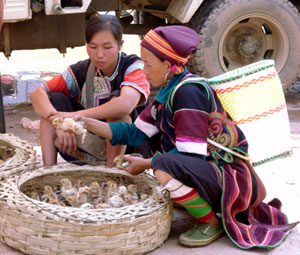 |
A Dai woman and Hani woman shop for chicks at Laomung Market. The purple costume is Hani. |
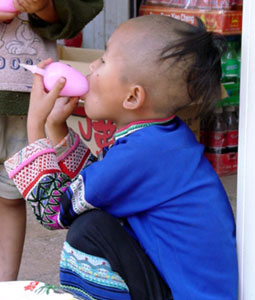 |
A young Hani boy with a traditional style hairdo leans against a freezer eating a popcicle at Laomung Market. |
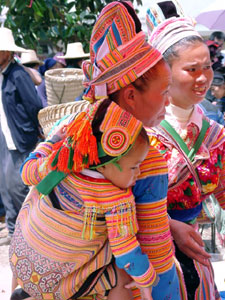 |
A Miao woman totes her infant in a colorful baby carrier at Laomung Market. |
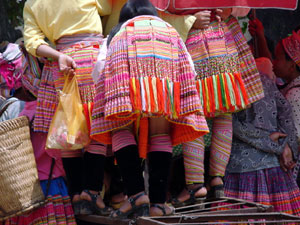 |
Young Miao girls stand on a steel support to view over the crowd of tribe people dazzled by a silver polish salesman from the city. Magically, the tribal people's tarnished decorative silver coins turn shiny! Laomung Market. |
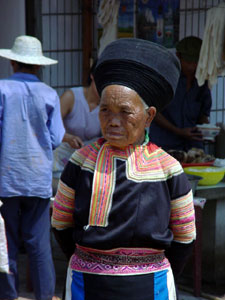 |
An elderly Miao woman watches shoppers at the Laomung Market. |
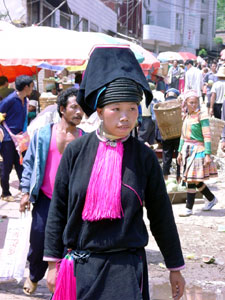 |
A Yao woman shops at Laomung Market. The Yao Tribes are generally more suspicious of outsiders and tend to maintain insular societies. |
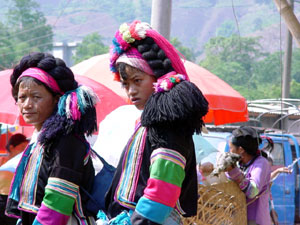 |
Yi Tribe woman with large black wigs look at products displayed at Laomung Market. |
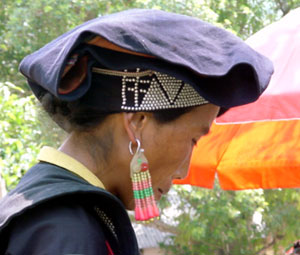 |
Another Yi Tribe woman with different headdress shops at Laomung Market. |
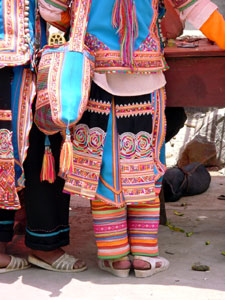 |
Hani girls in bright colorful traditional dress shop at Maje Market. The government issues cheap plastic sandals to every registered villager. What a contrast the shoes are to the local clothing. |
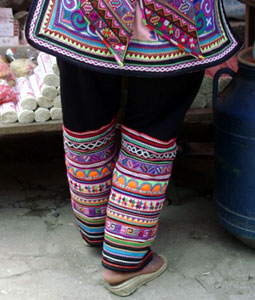 |
A Hani woman in more subdued colors (for a Hani) shops at Maje Market. |
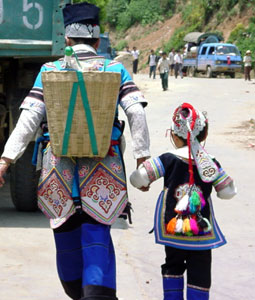 |
A Yi boy wearing traditional hat and clothes accompanies his mother to the Maje Market. |
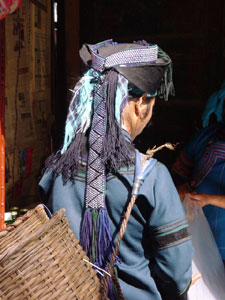 |
A Hani woman with unusual headdress carries her shopping basket to the Yuanyang Market. |
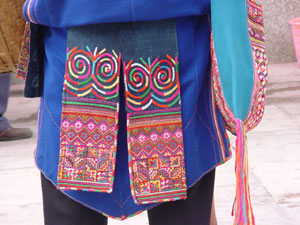 |
Experienced people can identify a tribe by the patterns on the clothing. Clothing color is not the determining factor. This Hani woman displays patterns that are absolutely Hani. Yuanyang Market. |
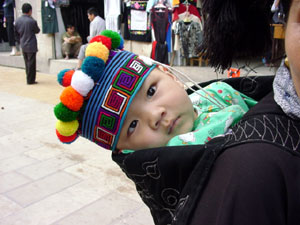 |
A Hani mother carries her infant in a baby carrier at Yuanyang Market. |
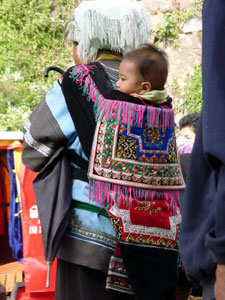 |
Another Hani mother carries her infant in a colorful baby carrier at Yuanyang Market. |
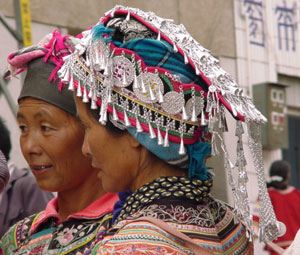 |
A Yi woman tries on a ceremonial crown at Yuanyang Market. |
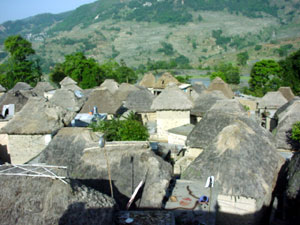 |
Qingkou Village has houses with unusual thatched roofs. This is the only town near Yuanyang that imposes an admission fee to visit. |
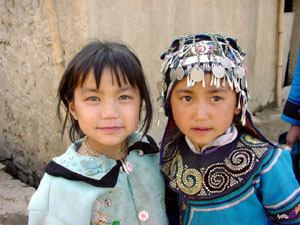 |
Hani girls at Qingkou Village pose for a photo. |
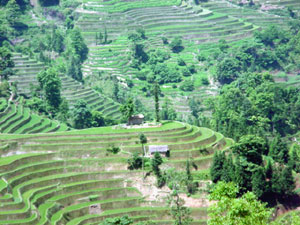 |
Around Yuanyang, beautiful rice terraces span the hills. The public road traverses the terraces high above the rivers below. A simple minibus ride from Yuanyang to one of the village markets crosses views similar to this. |
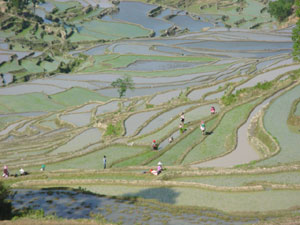 |
Farmers work dawn to dusk in knee-deep mud planting the rice crop on steep terraces. |
 |
Many farmers wear colorful traditional costumes while planting. Tourists rarely venture into this section of Yunnan Province. The costumes aren't for show; they're part of daily life. |
Copyright © 2000-2002 Wes and Masami Heiser. All rights reserved.